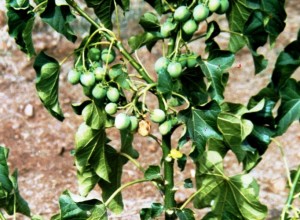
The goal of the project is to demonstrate that the weed can produce significant enough amounts of oil for conversion to biodiesel fuel.
General Motors Company announced today a five-year partnership with the U.S. Department of Energy (DOE) to help develop the jatropha plant for what could evolve into a sustainable biofuel energy crop.
Jatropha plants produce an oil that can be refined into biodiesel fuel.
The drought-resistant, non-edible plant can be grown commercially with modest care on marginal land.
To explore whether new varieties of the plant can produce high enough yields to make it viable while thriving in temperate climates in the U.S. is the point of the experiment.
“Discovering new sources for biodiesel production is an important part of DOE research and development efforts,” said Secretary of Energy Steven Chu. “The expertise of this team can help speed the pace for the development of jatropha as a biofuel crop.”
Two jatropha farms will be established in India: a 16-hectare (39.5 acre) plot in Bhavnagar and a 38-hectare (93.9 acre) plot in Kalol, near GM’s India Car Manufacturing plant. An existing 30-hectare (74.1 acre) jatropha farm in Bhavnagar also will be managed under this project.
Lab-optimized strains of jatropha will be cultivated at these farms.
The joint DOE-GM funding, an unspecified amount, will also enable the Central Salt & Marine Chemicals Research Institute (CSMCRI)—an Indian Government research facility, to manage all of the 84 hectares (840,000 m2). A complete life-cycle analysis will be conducted to evaluate the environmental impacts, starting with fertilizer production from raw materials and ending with the harvesting of jatropha fruits.
“In the long term, if jatropha is commercially viable, it will reduce dependence on petroleum as well as reduce greenhouse gas emissions and promote economic growth,” said Mike Robinson, GM Vice President of Environment, Energy and Safety Policy.
GM continues to invest in other alternate fuels such as cellulosic ethanol. Coskata recently announced plans to join a consortium, in conjunction with GM’s Australian Holden division, to study the construction of a bio-ethanol plant in Australia. Coskata, partially owned by GM, is also running a demonstration plant in Pennsylvania. See Biomass Ethanol Moves a Semi-Step Forward.
It is thought that using biomass – inexpensive farm waste – could radically alter the economics of ethanol and other biomass fuels. For example, making ethanol from the cellulose of plants is less costly than using corn grain. Switch grass, a crop that grows readily in the U.S. east of the Rocky Mountains, and corn leaves and stalks or other crop wastes are cheap to acquire and potentially solve the starvation issue, which arises from using corn for fuel instead of feed.
In addition to cellulosic ethanol, bio-based diesel alternative fuels can replace fossil diesel. A significant portion of transportation fuel in places such as India and Europe relies on diesel. The two fuels are not interchangeable.
